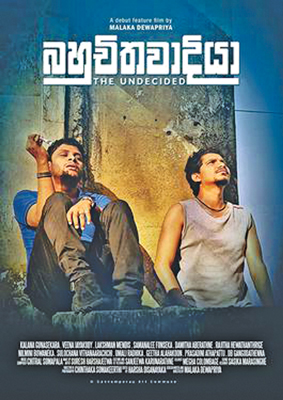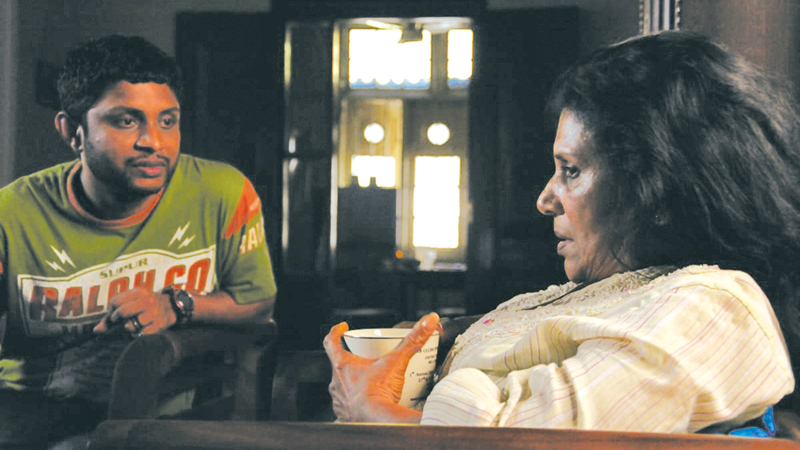Continued from last week
* Kanchana: Sasitha’s ex-girlfriend, Kanchana, initially shared “real chemistry” with him, suggesting a lost potential for genuine connection. Her subsequent involvement with Sasitha’s married boss is a classic and unfortunate scenario frequently seen in counselling sessions. The boss also depicted as a married man, promises Kanchana marriage – an obvious lie often used to manipulate vulnerable individuals into sexual relationships. Kanchana’s belief in these false promises makes her a textbook case of someone susceptible to manipulation and in dire need of support to process the emotional fallout and recognize harmful relationship patterns. This storyline powerfully illustrates a common societal trap faced by many women.
* Iranganie: With Iranganie, a mature woman, the relationship appears more transactional and less overtly romantic. Sasitha seems to provide companionship for her loneliness, while he expects money or a chance to go to Germany in return. This reflects a pragmatic, yet emotionally hollow, exchange, born out of mutual, albeit different, needs.
* Kumari: Kumari uses Sasitha for sex and affection and company, primarily because her husband is in the UK. She seems to have no grander expectations from him. However, Sasitha, in turn, eyes her connection as a potential opportunity to go to the UK. This mutual exploitation, while seemingly consensual on the surface, still underscores a profound lack of emotional depth and genuine connection.
These diverse relationships are not just plot devices; they are astute observations of true stories that are remarkably common in Sri Lankan society, a testament to Devapriya’s keen eye for social realism.
Sasitha’s sister: A portrait of unaddressed needs
 Sasitha’s sister’s entanglement with his friend – a younger, divorced, irresponsible, unemployed, and seemingly miserable fellow – adds a layer of raw realism to the film. Her willingness to give him money and trust him, despite his obvious shortcomings, is a powerful portrayal of a specific kind of female vulnerability in the Sri Lankan context.
Sasitha’s sister’s entanglement with his friend – a younger, divorced, irresponsible, unemployed, and seemingly miserable fellow – adds a layer of raw realism to the film. Her willingness to give him money and trust him, despite his obvious shortcomings, is a powerful portrayal of a specific kind of female vulnerability in the Sri Lankan context.
Her situation vividly illustrates the plight of women who are frustrated by the lack of sexual and marital fulfillment. In a society where women’s sexual needs are often overlooked and remain an unaddressed problem, finding appropriate avenues for intimacy and connection can be incredibly challenging. Unlike men, who might frequent establishments such as ‘spas’ for transactional sexual encounters without emotional ties, women in Sri Lanka are generally not accustomed to, nor do they have readily available or socially acceptable, outlets for such needs.
This societal gap can leave women feeling isolated, sexually frustrated, and desperate for any form of intimacy or companionship, even if it comes at a significant personal cost. Sasitha’s sister, in this light, becomes a symbol of women who, in their yearning for connection and perhaps unspoken sexual needs, might lower their standards, invest disproportionately, and overlook glaring red flags in a partner. Her actions are not just about love; they’re about seeking something – be it affection, companionship, or sexual release – in a context where these needs are often culturally suppressed or unacknowledged.
Filmmaking as psychological commentary
The film’s cost-effective production methods are cleverly integrated into its psychological subtext. The constant depiction of Sasitha riding his bike with the sides of the road, buildings, and sky passing by – rather than a focused frontal view – is a stroke of cinematic genius.
This visual choice powerfully symbolizes Sasitha’s lack of focus, direction, and genuine purpose. He is merely moving through life, observing the fleeting periphery, without a clear destination or internal compass. This subtle yet profound visual metaphor brilliantly encapsulates his psychological state: an aimless existence, always looking outwards for opportunities and validation, never truly centering himself or his own path.
‘Bahuchithawadiya’ is an incredibly insightful film, not only as a piece of cinema but also as a profound psychological study. Through Sasitha’s disoriented journey and the myriad relationships he navigates, Malaka Devapriya lays bare the vulnerabilities, deceptions, and transactional nature of human connections in contemporary Sri Lankan society.
The film serves as a compelling reminder of the complex interplay between individual psychology and societal pressures, and the often-unseen emotional costs borne by those caught in such tangled webs.
The film also subtly underscores how the systemic flaw in education can spawn a generation of individuals who are academically credentialed but vocationally lost. Sasitha’s unfocused energy and constant reliance on others for a breakthrough are not mere personal failings, but also poignant symptoms of an educational system that fails to equip its students with the foresight and self-knowledge necessary to navigate the complexities of adult life and career choices. It’s a powerful and overlooked aspect of his psychological makeup, directly linking individual behaviour to broader societal and institutional shortcomings.
By including Sasitha’s sister, Devapriya further deepens the film’s social commentary. It highlights how societal norms surrounding female sexuality and marriage can push individuals into compromising situations.
The film doesn’t only show transactional relationships from a male perspective (Sasitha’s); it equally exposes the sometimes desperate measures women resort to when their fundamental needs for intimacy and partnership are unmet within rigid social structures.
It’s a powerful statement on the unequal landscape of sexual expression and marital expectations in Sri Lanka, making ‘Bahuchithawadiya’ an even richer, more psychologically complex, and socially resonant film.
Unlike men, who might frequent establishments such as ‘spas’ for transactional sexual encounters without emotional ties, women in Sri Lanka are generally not accustomed to, nor do they have readily available or socially acceptable, outlets for such needs.






